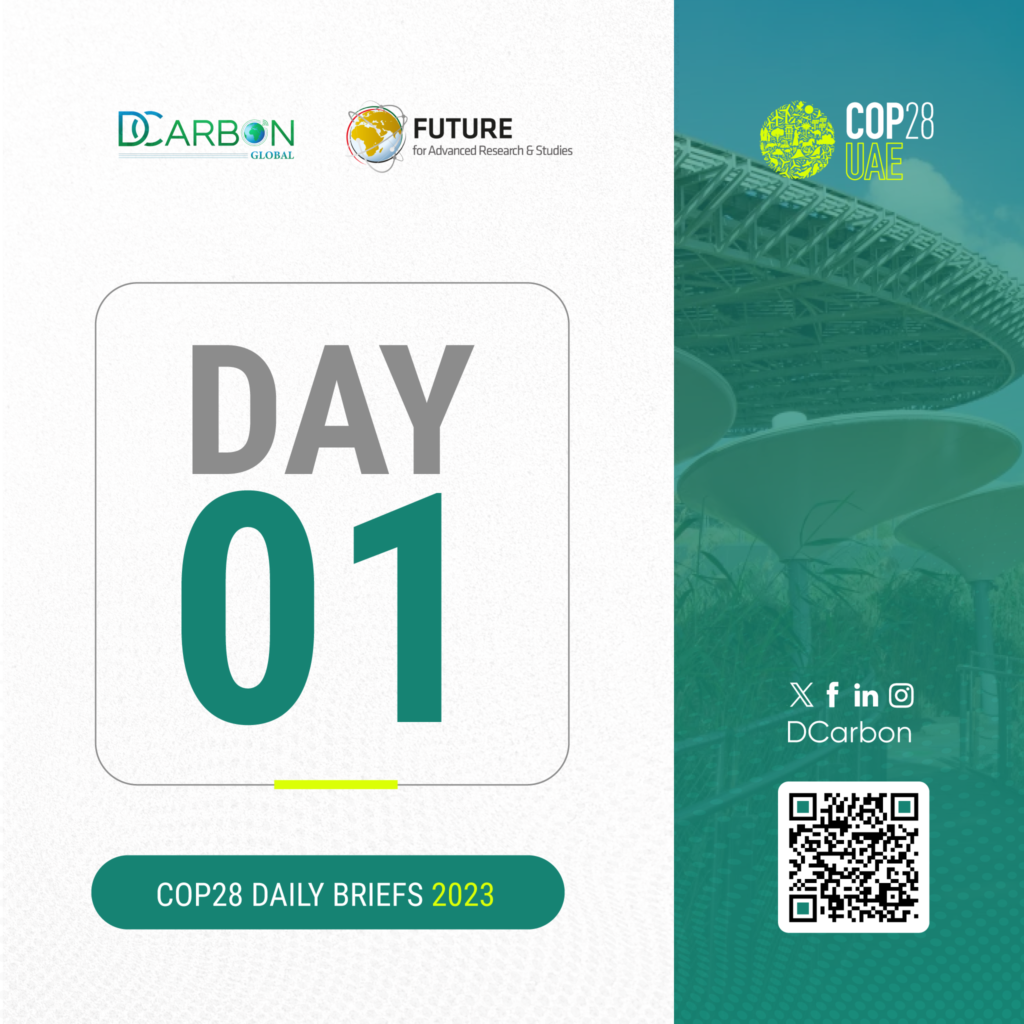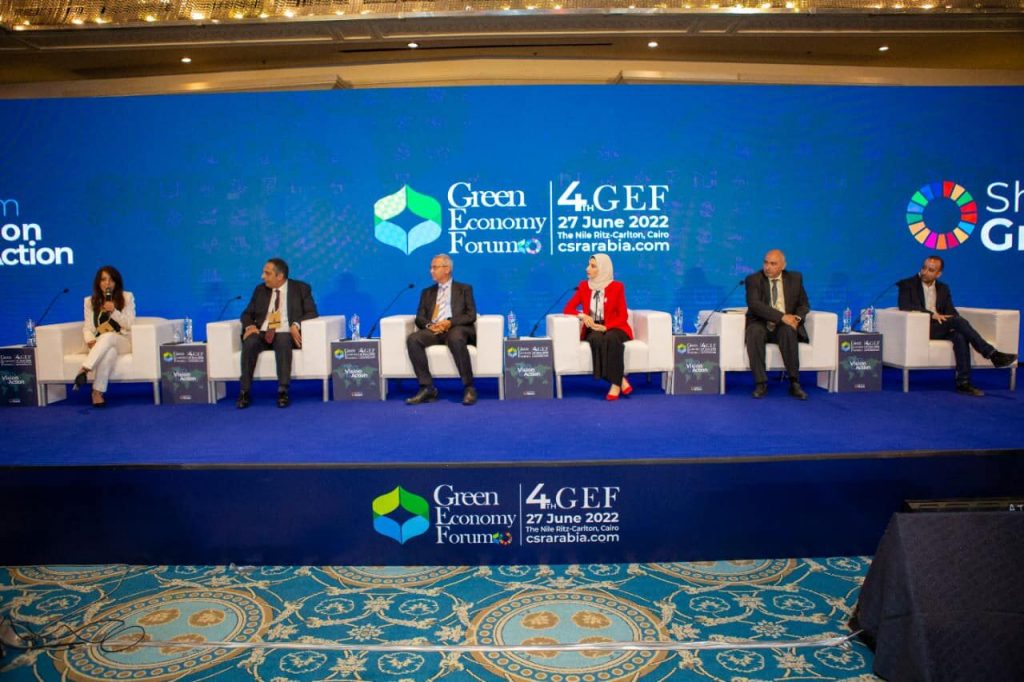Dubai, 30th November 2023
Opening Highlights
Sultan Al Jaber Kicks Off COP28 in Dubai, Calls for Global Unity on Fossil Fuels
Sultan Al Jaber officially launched the twenty eighth Conference of Parties (COP28) climate talks in Dubai, wielding the symbolic presidency hammer. In his opening words, Al Jaber tackled the thorny issue of incorporating fossil fuels and renewables into the negotiation text, urging collective effort. Despite engaging in challenging discussions with oil and gas companies, he highlighted the insufficient nature of current commitments, emphasizing the need for these companies to go beyond adopting net-zero targets for 2050. Concerns loom as none have committed to reducing the production of polluting fuels, with Adnoc, the UAE’s state oil giant under Al Jaber’s leadership, notably pushing ambitious plans that challenge established net-zero goals.
In a notable turn, Al Jaber’s call for cooperation on fossil fuels resonated with delegates. The discussions marked a historic moment as he acknowledged the industry’s hard discussions and urged a proactive engagement with oil and gas companies. While recognizing the strides made by some national oil companies towards net-zero targets, Al Jaber emphasized the urgency for more substantial actions. The spotlight remains on the industry’s commitment to addressing emissions beyond production and embracing a holistic approach to achieve meaningful climate goals.
COP28 President Al Jaber Sparks Debate by Advocating for Fossil Fuels
Amidst the unfolding of COP28, President Al Jaber, also the CEO of the UAE’s state-run oil company, delivered an atypical opening address, championing the role of fossil fuel companies in the global energy transition. While acknowledging industry shortcomings, he argued for their leadership, asserting that technology could capture emissions and sustain the industry for decades. Skepticism arose as scientists cautioned against undue reliance on technological solutions, with the International Energy Agency dismissing the notion of extensive carbon capture as an “illusion.” Al Jaber’s vision clashes with a recent report outlining the imperative for a significant reduction in the oil and gas industry. The report emphasized the necessity for a substantial shift in investment towards clean energy, challenging the industry to increase its clean energy capital from 2.5% to 50% by 2030 to align with the Paris climate agreement.
Al Jaber’s advocacy for fossil fuels sparked a lively debate among participants. While he highlighted industry efforts to cut methane emissions and reach net-zero by 2050, concerns lingered about the exclusion of end-use emissions from these targets. The clash between his vision and scientific realism became apparent, especially with the International Energy Agency’s stark assessment. The report underscored the industry’s need for a substantial reduction, challenging Al Jaber’s optimistic view of a prolonged role for fossil fuels. The ongoing debate underscores the complex and contentious nature of shaping the global energy transition.
Landmark Accord Achieved on Day One of COP28 as Nations Unanimously Approve ‘Loss and Damage’ Fund for Climate-Impacted Nations
Delegates at COP28 made history by unanimously endorsing the operationalization of the Loss and Damage Fund, designed to provide crucial financial assistance to economically challenged nations grappling with the repercussions of climate breakdown. This early triumph marked a significant step forward in international cooperation, addressing the urgent needs of affected nations and rectifying imbalances faced by the most vulnerable. While the agreement is pending formal approval at the close of the conference, the standing ovation from delegates reflects the fund’s crucial role in supporting communities during disasters, aiding farmers with devastated crops, and assisting those permanently displaced by rising seas. The swift and substantial flow of funds, urged by Ani Dasgupta, is now paramount, as vulnerable countries face the prospect of $580 billion in climate-related damages by 2030. This groundbreaking decision not only signifies a clear commitment to climate justice but also underscores the global community’s determination to tackle the challenges posed by climate change.
UAE Spearheads COP28 Initiatives with a $100 Million Pledge to Loss and Damage Fund
In a demonstration of proactive leadership, the United Arab Emirates (UAE), the host country of COP28, made an immediate and substantial commitment by pledging $100 million to the Loss and Damage Fund. This announcement swiftly followed the historic agreement on funding arrangements for addressing the impacts of climate breakdown. The UAE’s significant financial commitment is a crucial step toward aiding vulnerable communities and fortifying resilience in the face of climate change’s devastating effects. President Sultan al-Jaber highlighted the historical nature of this decision, marking the first time a COP has adopted a decision on its inaugural day.
The UAE’s pledge of $100 million echoes its commitment to take tangible actions to support communities grappling with climate emergencies. The move sets a noteworthy precedent for other nations, with Germany, the US, Japan, and the UK also stepping up with financial commitments. This collective effort reflects a shared responsibility to address the urgent needs of those affected by climate-related damages, marking a promising start to COP28’s discussions on climate finance and loss and damage.
India Asserts Continued Reliance on Coal as Prime Minister Modi Heads to COP28
As Prime Minister Narendra Modi gears up for COP28, India’s Foreign Secretary, Vinay Mohan Kwatra, affirmed that coal would remain a significant component of the country’s energy landscape for the foreseeable future. In a pre-summit statement, Kwatra emphasized the importance of coal in meeting India’s energy needs, acknowledging its pivotal role, despite global efforts to transition away from fossil fuels. India presently relies on coal for nearly three-quarters of its electricity generation, with a surge in coal-based power generation capacity to address escalating power demands.
Blue Zone events
COP28 Hosts RM Technical Event: Navigating the Effects of Response Measures on Just Transition and Economic Diversification
COP28 introduces a crucial RM Technical Event, providing a forum to dissect the multifaceted impacts of response measures (RMs) on just transition and economic diversification. Participants will engage in a dialogue addressing pivotal questions, including the informative role of analyzing RM effects in shaping climate policies, just transition initiatives, and economic diversification strategies. The event aims to uncover obstacles and prospects encountered by countries and organizations in achieving sustainable economic practices within the context of climate action. Additionally, the discussion delves into socio-economic impacts stemming from climate commitments and explores monitoring methods and tools employed to actively track these effects across key sectors. This event serves as a focal point for collaborative exploration and knowledge exchange, emphasizing COP28’s dedication to understanding the intricate dynamics of response measures on a global scale.
Youth Empowerment Takes Center Stage: COP28 Hosts Orientation Session for Young Delegates
In a dedicated effort to empower the next generation of climate leaders, COP28 hosted an Orientation Session for youth delegates, moderated by Watan Mohamed Abdelrahman from the YOUNGO Policy Team and Laura Viñuela from the Action for Climate Empowerment Team at UN Climate Change. The core of the session focused on providing young attendees with essential information on the proceedings of COP 28 and how they can actively engage in the conference.
The session kicked off with welcoming remarks and an outline of objectives by Ina Parvanova, Director of Communications and Engagement Division at UN Climate Change. This set the tone for a focused and informative session designed to provide young delegates with the knowledge and tools needed to navigate COP28 effectively. Megumi Endo from the Observers Relations Team shared general information pertinent to admitted observers, ensuring that youth participants are well-prepared and actively involved in the COP28 discussions. This Youth Orientation Session underlined the commitment to inclusivity, knowledge sharing, and fostering active youth participation in shaping the global climate agenda.
COP28 RM Technical Event Explores Private Sector’s Role in Creating Decent Work and Quality Jobs in Low GHG Emission Sectors
A pivotal RM Technical Event at COP28 focuses on the private sector’s crucial role in fostering decent work and quality jobs within low greenhouse gas (GHG) emission sectors. The dialogue will address key questions, unraveling the mechanisms through which the private sector, including small and medium-sized enterprises (SMEs) and public-private partnerships (PPPs), contributes to the creation of employment opportunities while minimizing carbon footprints. Participants will delve into how the private sector actively engages in and supports transition policies, particularly those centered on decent work. Discussions will further explore enabling policies that empower the private sector, including SMEs and PPPs, to champion just transition objectives. Key themes include highlighting challenges, sharing lessons learned, and unveiling best practices in the pursuit of creating decent work and quality jobs in sectors with low GHG emissions. This event underscores COP28’s commitment to exploring sustainable collaborations between the private sector and climate-oriented policies on the global stage.
ICA-ETF Poster Session Unveils Global Climate Progress and Pathways at COP28
As an integral part of COP28, the International Consultation and Analysis (ICA) – Enhanced Transparency Framework (ETF) poster session takes center stage outside Meeting Rooms 5&6. This initiative aims to provide a comprehensive overview to the broader audience, delving into the multilateral process tailored for developing countries. The session meticulously explores the evolution of global climate actions, mapping a trajectory from the past to the present, with an eye on informing the future, particularly under the enhanced transparency framework of the Paris Agreement.
This dynamic poster session serves as a platform to showcase the diverse experiences and achievements of countries engaged in the technical analysis and facilitative sharing of views. The spotlight is on successful endeavors related to reducing greenhouse gas emissions, implementing mitigation strategies, and addressing implementation challenges. In the ever-evolving landscape of climate transparency, COP28 introduces a refined multilateral process, fostering improved interaction and active participation through innovative formats. Attendees are invited to zone B1 outside meeting rooms 5 and 6 to immerse themselves in the presented information, pose questions, and engage in discussions on the multilateral process. This initiative underscores the collective progress towards the ambitious goals of the Paris Agreement, emphasizing shared learning, international collaboration, and capacity-building as essential components of global climate action.
References
Cop28 live: key funding deal to help poorer nations cope with impact of climate crisis agreed (theguardian.com)
COP28 climate summit begins in Dubai: Live updates and agenda – The Washington Post
Cop: Parties agree on loss and damage fund setup | Argus Media
COP 28 Daily Programme | UNFCCC





